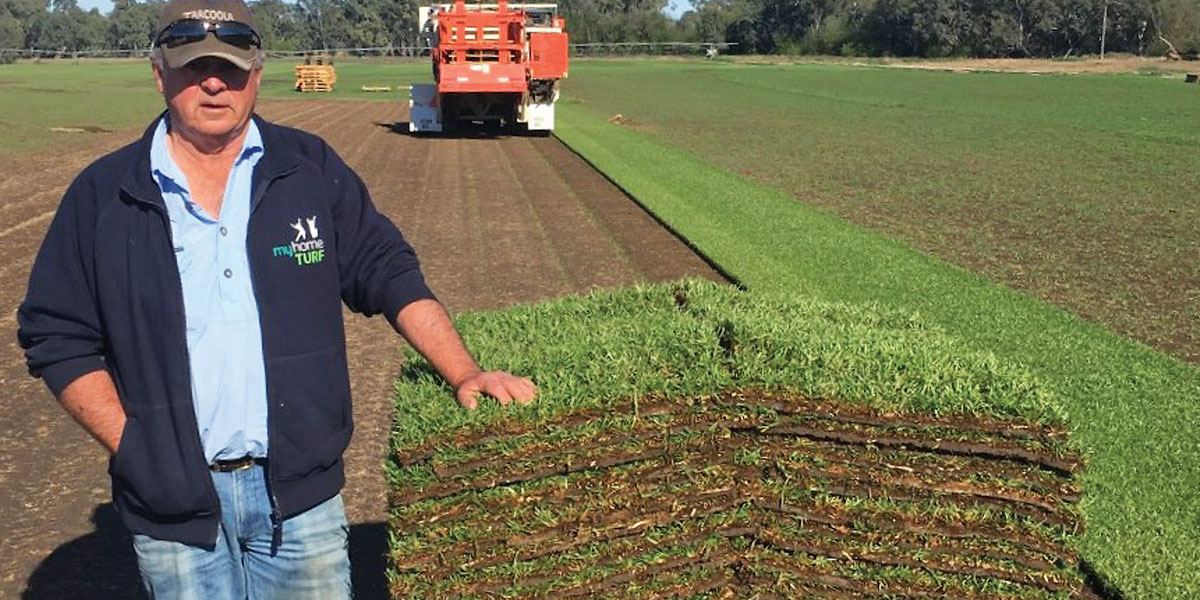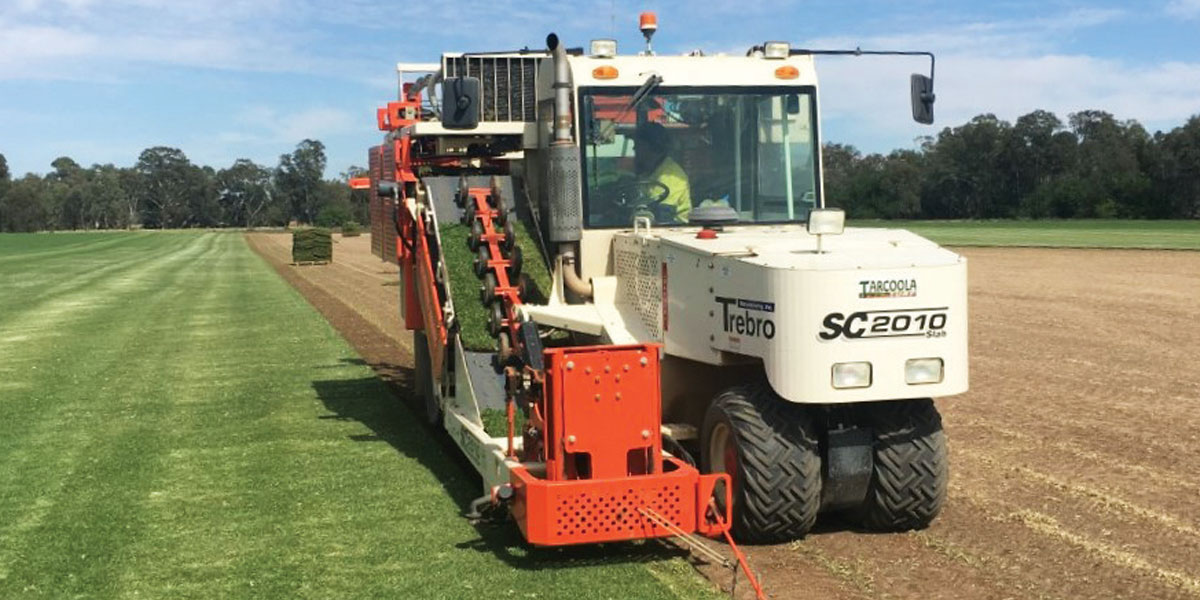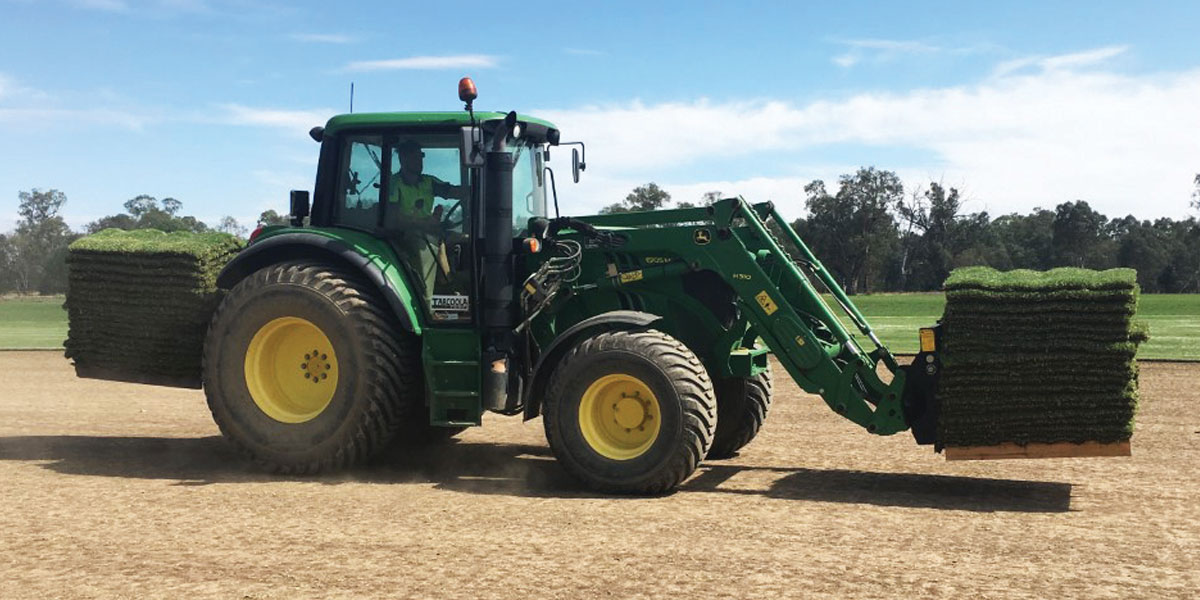AT A GLANCE
Growers: Tarcoola Turf, Ken and Susan Tyson
Property: Gillard Road, Wagga Wagga, NSW
Focus: Collaboration and diversification
Market: Commercial, trade and retail sales of Sapphire Buffalo, Tarcoola Kikuyu, Village Green, Legend Couch and Tarcoola Kikuyu/Rye
After cutting his teeth supplying turf to golf courses in the early 2000s, Tarcoola Turf founder Ken Tyson found a niche: reconstructing country sports fields. Sandra Godwin speaks to him about how he found that niche and has value added his product.

Above: Ken Tyson with a fresh sale of Kenda kikuyu.
A former lucerne hay producer, Ken Tyson began converting his enterprise to turf in 1998.
Tucked into a bend on the Murrumbidgee River, just a few minutes east of the centre of the largest inland city in New South Wales (NSW), he’d been looking for a more suitable crop.
“We’re on a floodplain here, so you get floods and lucerne doesn’t like getting wet feet,” Ken said.
“I was looking for an alternative. There was Kikuyu coming in from Sydney and it was a new growth industry at the time. It appeared to me that Kikuyu was the go-to grass in those days – it probably still is – and we put a bit in to start it off.”
The farm now has 40 hectares under lateral irrigators planted to five varieties of turf and supplies customers across southern NSW and north eastern Victoria. Tarcoola Turf also has a cooperative arrangement with Australian Capital Territory turf producers Can Turf, at Fyshwick, supplying them with warm season varieties and in return selling their cool season varieties.
Not content with producing the best possible quality turf, Ken identified a gravel deposit nearby and started a quarrying business. That’s also expanded over the past two decades, now turning out 40 truckloads of aggregate a day destined for infrastructure projects across southern NSW.
His favourite aspect of growing turf is being able to transform existing sports fields and play a role in the creation of new grounds. Past projects have included golf courses designed by champion golfers Greg Norman, David Graham and Graham Marsh in the early 2000s.
“We don’t do much golf course work now, it’s mostly sports fields we concentrate on,” Ken said.
“Right from the beginning, we’ve taken on line planting of sports fields over to warm season grasses from cool season grasses, or from no grass at all.
“We’ve taken that to another level in the last two years. Now we’re able to do full reconstruction of country sports fields – the city-type reconstructions – like the Laurie Daley Oval at Junee, with bulk earthworks, laser levelling, irrigation, laser drainage and amendments, as well as a turf variety that suits the area.”
Tarcoola Turf also sells turf to landscapers, builders and direct to homeowners. The cheaper, hardy Tarcoola Kikuyu is the most popular variety, but demand for Soft Leaf Buffalo has risen consistently over the past five years with the shrinking of house blocks.
“And that’s where the Sapphire comes into its own … It’s as shade tolerant as any other variety. We’ve graduated from Sir Walter to Sapphire and we’re looking at establishing a wholesale side to the business.”
“And that’s where the Sapphire comes into its own,” Ken said. “It’s as shade tolerant as any other variety. We’ve graduated from Sir Walter to Sapphire and we’re looking at establishing a wholesale side to the business.”
Ken is continuing his research into other suitable turf varieties, including Prestige.
Zoysia grasses were trialled previously, but they struggled with the extremes of temperature: from a month of 40-plus degrees centigrade each summer to as many as 60 frosts during winter.
“We need a Couch variety to replace Legend,” he said. “It’s done a great job for us, but it’s had its time.”
Ken is fortunate to have the support of a loyal team of employees, who keep the farm ticking over, allowing him to concentrate on business development and marketing.
The team includes Mark Barton, who has managed the farm for 15-years, office manager Renea Hobbs and Tim Doyle who makes the deliveries each day.
Ken also counts himself lucky to have access to the quarry’s high security water licence, which might become crucial if conditions don’t improve in the next few months.
Along with much of inland NSW, Wagga Wagga remains in the grip of drought. Average annual rain is 571 millimetres (mm), but after two years of below average falls, just 104mm was recorded during the first four months of this year.
The farm received a welcome downpour of 36mm the night before the Wagga Gold Cup race day in May. It was enough to earn the track a heavy rating and stop the turf harvest for a day, but not enough to break the drought.


Above: Harvesting at Tarcoola Turf, Wagga.
Access to water at an affordable price is Tarcoola Turf’s greatest challenge. The farm relied on carryover from the previous year to top up the 7 per cent general security water allocation for 2018-19.
Ken said buying high-security water for the turf farm was not a viable option – at the current price of $7000 a megalitre, it would cost $2 million.
Recently he shelled-out $50,000 to buy 100 megalitres on the temporary water market and will be allowed to carry over 40 per cent of what’s unused at June 30. Based on the current levels of the Burrinjuck (29.9 per cent) and Blowering (28.8 per cent) dams, he expects the 2019-20 allocation for general security on the Murrumbidgee to open at zero.
“The water we have available … should keep us going until November,” Ken said.
If the unthinkable occurs, and there is no significant rain in the catchments between now and then, some of the quarry’s high security water will be needed to irrigate the turf this summer.

